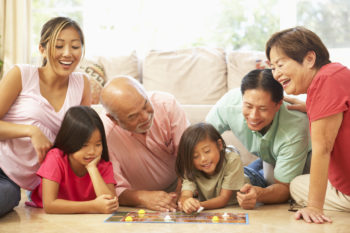The Power of “No”
 The Power of “No”
The Power of “No”
My daughter was always an eager, adventurous eater. Once she was old enough to be introduced to solid foods, there was no stopping the discovery of culinary delights! She slurped down noodles, chomped up her vegetables, sipped on bone-broth soups. She sampled foods from every cuisine including American, Chinese, Mexican, Japanese, Thai, and Greek. However, we started discovering that she complained about certain cookies, or Vietnamese noodles, or some but not all granola bars. Completely baffled, we asked her what was wrong with these foods and she said that they were spicy. Soon enough, she had her first ever PB&J sandwich. That’s when her face got red and swollen, her throat closed up making breathing difficult – she was experiencing an anaphylactic reaction to peanuts.
In the aftermath of discovering her peanut allergy, we had to make lots of changes in her diet. Our once adventurous eater became a hesitant eater. One could even call her a picky eater, but no one was blaming her! When she asked why she had allergies, we explained that every person is born with certain physical attributes and personality traits, and it’s what we do with them that gives us character. We explained to her that her physical attribute of having a food allergy might be contributing to the development of a strong personality trait of self-control. In other words, my 5-year-old was learning the power of “no” at an early age.
Setting Boundaries
What does “no” look like to a 5-year-old in this context, you may wonder? Some kids may think that “no” is a punishment, a restriction, or a denial of privileges and pleasures. However, you may actually be surprised that this is not the case! A “no” response to certain foods meant that my daughter trusted her parent’s better judgement for her safety. A “no” response meant that my daughter acknowledged and respected her natural limitations and boundaries.
So how is this powerful? She is now 13 years old, but from a young age, my daughter has learned the power of “no” and has used it many times. Here are some of the lessons learned:
- It’s ok to say “no” to friends. Just as peanuts are bad for her, she has realized that certain friendships and relationships can be toxic, too.
- It’s ok to say “no” as a means of delayed gratification. She has received many gift cards for birthdays and holiday gifts, but has said “no” to impulse spending. Instead, she saved them up to buy something better and more significant, usually when it is at a discount.
- A “no” response is an opportunity to explore something different. After a while, being allergic to peanuts did not stop her from trying new foods. Bring on pickled herring, stinky tofu, kimchi, and durian! This same spirit of exploration was applied to playing sports, learning a new hobby, and learning how to cook.
- A “no” response is not always the final answer. It may mean that her desired outcome was meant to happen after some reflection or personal growth, perhaps at a different time or with a different outcome all together.
- Sometimes, “no” means “no.” Not everything in life goes our way and sometimes, we have to learn to accept reality and be content. Being content is truly liberating!
How are you practicing the power of “no” with your kids?
Jaime
Copyright © 2020 by GenParenting